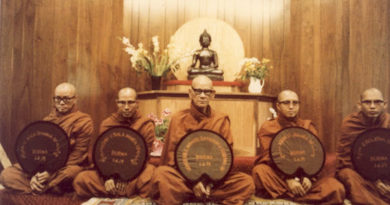Thoughts On The Dhamma – Contents And Preface
CONTENTS |
|
0. The Venerable Mahasi Sayadaw 1. The Dhamma 2. The Burden of the Aggregates 3. Ethics 4. Concentration 5. Meditation 6. Insight Meditation
|
____________________
Preface
While the present book was in preparation, its author, the Venerable Mahasi Sayadaw of Burma, passed away at the age of 78. Thus, unexpectedly — as death so often comes — this publication has turned out to be a memorial issue in honor of one of the outstanding contemporary teachers of Theravada Buddhism, especially in the field of insight meditation (Vipassana). It was not long before he passed away that the Venerable Sayadaw had conveyed his consent to a compilation of his thoughts and observations, chiefly on insight meditation.
The selections here presented have been taken from sermons of the Venerable Mahasi Sayadaw dealing with various Suttas (Discourses of the Buddha). The sermons had been delivered in the Burmese language and were translated into English by various hands. A set of seven books containing these English translations was published in 1980 by the Buddha Sasana Nuggaha Organization of Rangoon (“Sasana Yeiktha”), which gave its kind permission for extracts from these books to be reproduced in the present anthology. These selections have been slightly edited, and references to their sources are given after each extract. A short biography of the Venerable Author is also included here.
In issuing this anthology, it is hoped that the sayings will be found instructive and inspiring, and that they will stimulate the reader to take up earnestly the threefold cultivation of morality, meditation, and wisdom, reaching their culmination in liberating insight wisdom.
It was a direct approach to that liberating insight (vipassana) which the Venerable Mahasi Sayadaw taught for many decades to a very large number of meditators from East and West. Based on the “Foundations of Mindfulness” (satipatthana), he devised an effective method of meditative practice, partly derived from tradition and his own teachers, and partly evolved by himself. This method certainly demanded, or led to, a high degree of mental concentration, but did not require the prior attainment of full meditative absorption, the jhanas. Yet, as some of the extracts in this book will show, the Venerable Mahasi Sayadaw was fully aware of the great significance of full concentration of mind in the jhanas, and he neither discouraged their cultivation nor belittled their value. But as a wise and compassionate Teacher, he wanted to help those who, for psychological or environmental reasons, would have been faced with a long and frustrating struggle in their attempts to gain jhanic concentration.
For such a person, the method of direct insight practice could open an access to the core of the Teaching by direct meditative experience. In the course of the diligent practice of that method, there would follow a natural growth of mindfulness and concentration, of inner firmness and calm, which would place the meditator in a better position to attain to the jhanas.
In conclusion, the undersigned wishes to express his humble respect to the late Venerable Mahasi Sayadaw, and his deep-felt gratitude for the guidance and inspiration he received from him.
— Nyanaponika
Forest Hermitage
Kandy, Sri Lanka
September 1982
—————————–
Bài viết được trích từ cuốn Thoughts On The Dhamma, tác giả Tỳ Khưu Mahasi Sayadaw
Link cuốn Thoughts On The Dhamma
Link tải sách ebook Thoughts On The Dhamma
Link video cuốn Thoughts On The Dhamma
Link audio cuốn Thoughts On The Dhamma
Link thư mục tác giả Tỳ Khưu Mahasi Sayadaw
Link thư mục ebook Tỳ Khưu Mahasi Sayadaw
Link giới thiệu tác giả Tỳ Khưu Mahasi Sayadaw
Link tải app mobile Phật Giáo Theravāda









